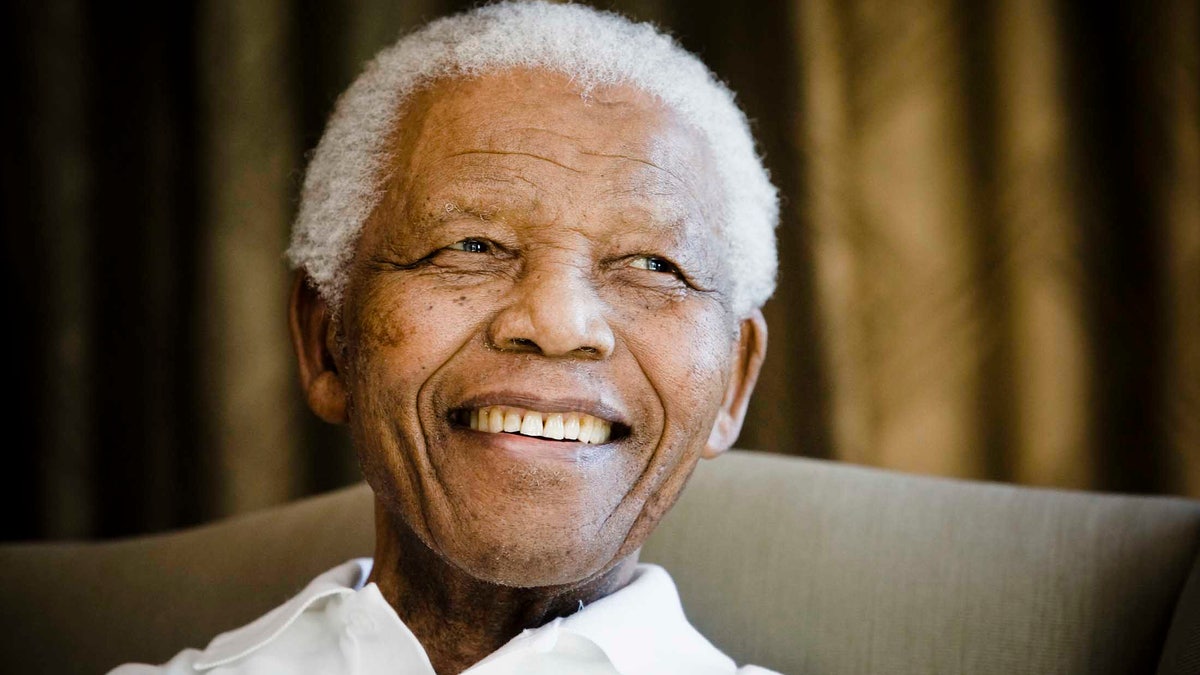
FILE - In this Tuesday, June 2, 2009 file photo, former South African President Nelson Mandela reacts at the Mandela foundation, in Johannesburg, South Africa, during a meeting with a group of American and South African students as part of a series of activities leading to Mandela Day on July 18th. Israel's state archive has published a 50-year-old letter stating that the Mossad spy service unwittingly offered paramilitary training to a young Nelson Mandela in 1962, and released a number of other documents showing a tense relationship between the Jewish state and apartheid-era South Africa. The release of the documents in the wake of Mandela’s death appear to be aimed at blunting criticism of Israel's close alliance with South Africa's apartheid rulers. (AP Photo/Theana Calitz-Bilt, Pool, File) (The Associated Press)
Saturday, December 5 marks the second anniversary of Nelson Mandela’s death. For many years, he languished in a South African prison, a victim of that nation’s apartheid policy. He was a political prisoner in the truest sense of the word. That experience usually embitters a man to the point of no return.
Instead, that prison became the crucible for refining his character to embody the one trait what would define him to the world. And change his country.
That one thing was forgiveness.
In some languages like Albanian, there’s not even a word for it. Retribution, yes. Vengeance, yes. But not forgiveness.
Few people really have embodied the power of that concept in our time like Mandela. And this is why he was so powerful a force for change.
He modeled what Jesus taught, especially in Matthew 6 where Jesus teaches His disciples a little prayer, which may be the most well-known prayer in Western civilization. We know it as the “Our Father.” It starts off simply enough, “Our Father, which art in heaven.” It takes off from there to reveal something deeply profound. Something Mandela grasped. And here it is: “forgive us our trespasses, as we forgive others who trespass against us. And lead us not into temptation.”
If you carefully look at what Jesus asked us to pray, this simple prayer gave us a glimpse of the heavenly modus operandi for enjoying a quality of life here on earth.
He meant to have us look outside of ourselves and beyond our circumstances to God’s heavenly kingdom as the focal point for understanding earthly existence.
The mystery, and the opportunity, is that we can experience now on earth the same kind of relationship that is experienced in heaven. They are one and the same.
Stop and think about that for a minute.
In effect, earth becomes the temporal training ground for the eternal. In my book, "The Politically Incorrect Jesus," I explain this in the chapter The Upside-Down Kingdom.
I call it upside-down as Jesus says that HEAVEN should be the frame of reference for earthly living. I think that Mandela caught a glimpse of that heavenly frame of reference while in prison which forged his view of the eternal. He came to understand the immense strength of the power of forgiveness. You see, forgiveness allows us to be released from ourselves, as well as from a jail cell. And to resist the temptation to exact revenge. Lack of forgiveness only leads one back to self-interest. And self-interest closes the gates to real freedom.
Mandela learned that forgiveness is integral for entering and enjoying the realities of God’s kingdom, so it’s important to begin that lesson on earth. We practice here and now for the real thing later on. We get a glimpse of it on earth and see it fully in action in heaven because only the forgiven and those who forgave will be there (Matthew 6:14-15). When put into practice, it has power to transform. Whether it’s one person. Or an entire society.
Mandela understood this. His focus was so refined in his imprisonment that it actually taught him to see more clearly. He would not let the temptations of revenge or bitterness cloud his vision for uniting his nation. He used the one tool he knew would best forge this new nation—forgiveness. He wanted to see the Kingdom of Heaven exemplified in his beloved South Africa.
In effect, Mandela became a microcosm of life in heaven right here on earth when he chose forgiveness over hate and vengeance.
We can choose as he did, as well.
Our world desperately needs to see forgiveness instead of retribution.
For a brief moment, the world saw it in Charleston after the shooting in June that claimed nine lives at the Emmanuel AME Church.
Several days after the shooting, with the assailant apprehended, family members and friends lined up to say they forgave the shooter Dylann Roof. What? Forgiving the shooter? The executioner of the innocents? That testimony stopped us in our tracks. That seemed.... unnatural. Yet somehow, in our hearts, it seemed like a right thing to do. That was another example of the upside-down kingdom.
On the other hand, if we continue to assign blame to all the wrongs of the world, whether on rogue cops, Muslims, politicians, our neighbor, etc., we will never experience peace in our society. Or even peace in ourselves.
Today, maybe we can reflect on Mandela’s life and find the power of interpreting the heavenly kingdom on earth. If so, then forgiveness will the hallmark of your life here...on earth...as it is in heaven. Amen.
Joe Battaglia is the president of Renaissance Communications, Inc. Prior to forming Renaissance in 1992, Joe was vice-president of Communicom Corp. of America, parent company of WWDJ/New York, WZZD/Philadelphia and KSLT/San Antonio. He was with Communicom for over 18 years, eight as General Manager of WWDJ, the company's flagship station.








































